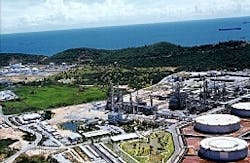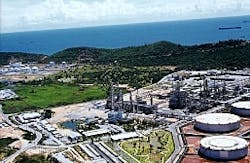Thai Oil Co. launches huge debt restructuring
After some delays, key creditors have finally reached a milestone agreement to accept Thai Oil Co.'s $2.25 billion proposed debt-restructuring plan.
Representatives of more than 120 creditors of Thailand's largest refiner signed a "recommendation letter" in Tokyo accepting the restructuring scheme, believed to be the largest of its kind in the world.
The creditors' accord came after Thai Industry Minister Suwat Liptapanlop went to Japan to personally convince certain major Japanese banks on a number of key policy issues that would support Thai Oil's future operation and viability, according to Thai Oil executives. Only a few weeks ago, creditors were reluctant to vote for approval of the comprehensive restructuring and put off voting until the middle of November.
A key to the acceptance by the core group of creditors' is the Thai government's policy to support possible integration of Thai Oil's refining operation and the marketing business of the Petroleum Authority of Thailand (PTT) as part of PTT's privatization plan, which is expected to be instituted starting in the second half of next year.
Thai Oil said the recommendation letter is a crucial factor supporting all other creditors' decision to vote in favor of the debt structuring plan. The letter will be sent, together with details on the restructuring scheme, to all creditors for consideration. Voting will take place on Nov. 12.
Representing the creditors are 11 banks that account for about 35% of Thai Oil's outstanding debt. They are: Bank of Tokyo-Mitsubishi, Bangkok Bank, Chase Manhattan Bank, DKB Bank, Dresdner Bank, IBJ, Industrial Finance Corp. of Thailand, Sanwa Bank, Sumitomo Bank, Thai Farmers Bank, and Warburg Dillon Read.
Debt restructuring
The debt restructuring framework accepted by the creditor group is in line with what the Thai cabinet endorsed on Aug. 24. The deal will cut Thai Oil's total debt burden of $2.25 billion to $1.385 billion, a move Thai Oil says will put it back on sound financial footing.
Among the key elements of the restructuring is a commitment by major shareholder PTT to inject $250 million of new equity into Thai Oil. PTT will supply crude and feedstocks to Thai Oil's 203,000 b/d Sriracha refinery and will have the right to purchase finished products amounting to at least 50% of Thai Oil's production capacity.
The PTT capital will be used toward buying back about $315 million of existing Thai Oil debt. Senior lenders will be invited to bid for this buy-out at a discount under a tender process. Lenders will receive a combined 49.99% of the ordinary Thai Oil shares by way of a debt-for-equity swap.
Thai Oil's current shareholders are: PTT, 49%; the Chowkwanyun family (the founder of Thai Oil), 25.95%; Royal Dutch/Shell, 15.05%; Caltex Petroleum Corp., 4.75%; Bureau of Crown Property, 2%; and others, 3.25%.
Under the plan, lenders that are not bought out will commit to the $1.385 billion of restructured debt. This debt will have a 10-year tenor, extendable at Thai Oil's option for a further 4 years on payment of an extension fee.
Thai Oil suspended interest and principal payment to its creditor in November last year when its financial troubles reached a critical stage. Its difficulties were caused by the plunge in regional and local refining margins, prompted by increased refining capacity and falling products demand.
The firm's gross refining margin has fallen from an average of $4/bbl before the Asian economic crisis to merely $2/bbl this year, far below the level needed to cover its interest costs. .


